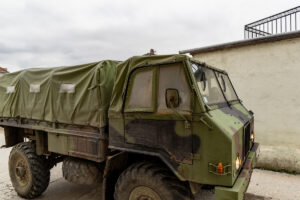In the complex geopolitical landscape of the Balkans, Serbia stands out as a nation at a crossroads, torn between its aspirations for European Union membership and its historical allegiance to Russia. This dichotomy is not merely symbolic but has manifested in a series of actions and policies that have significantly heightened tensions in the region. As the only European country that has steadfastly refused to align with EU sanctions against Russia following its invasion of Ukraine, Serbia’s stance is not just a diplomatic anomaly but a clear signal of its deepening ties with Moscow.

Under the leadership of President Aleksandar Vucic, a figure with past connections to the Milosevic regime, Serbia’s orientation towards Russia has become increasingly pronounced. Vucic, known for his populist approach and nationalistic rhetoric, has maintained a delicate balancing act, striving to keep Serbia on the path to EU accession while simultaneously forging closer ties with Russia. This strategy, however, is fraught with contradictions and risks, as Serbia’s actions increasingly align with Russian interests, often at odds with European norms and expectations.
The military dimension of Serbia’s relationship with Russia is particularly alarming. Serbia’s recent acquisition of Russian anti-drone systems, such as the Repellent, and its continued military build-up largely with Russian and Chinese assistance, underscore a commitment to a defense strategy closely aligned with Moscow. This military enhancement is not just for show; Vucic’s frequent references to potential threats, especially concerning Kosovo, indicate a readiness to use military force. The situation escalated dramatically in September 2023 when Serbian paramilitary forces entered Kosovo, resulting in a deadly encounter that claimed the life of a Kosovar policeman. This incident, which has gone largely unaddressed in terms of accountability, is emblematic of Serbia’s increasingly aggressive posture in the region.
The European Union and the United States, while expressing concerns, have been criticized for their somewhat appeasing stance towards Serbia. This leniency has only emboldened Vucic’s government, allowing it to pursue its dual strategy of seeking EU membership while deepening ties with Russia. This approach has left Serbia in a unique position within Europe: an EU candidate country that acts as a staunch ally of Russia, led by individuals who share Putin’s worldview and ideologies.
The broader implications of Serbia’s actions are significant, particularly in the context of Russia’s growing assertiveness in Eastern Europe. Analysts and policymakers across Europe are increasingly worried about the stability of the region, especially given the ominous warnings from Poland and German think tanks about Europe’s preparedness (or lack thereof) for a potential Russian military confrontation. The situation is further complicated by the uncertain commitment of the United States to NATO, particularly under a potential future presidency of Donald Trump, known for his ambivalence towards the Alliance.
In this context, Serbia emerges not just as a source of regional tension but as a potential flashpoint in a larger geopolitical struggle. Its military buildup, aggressive actions in Kosovo, and close alignment with Russia present a stark challenge to the stability of the Balkans and the security of Europe. With Vucic’s administration showing no signs of pivoting away from Moscow, the risks of escalation and conflict in the region remain high. The EU and NATO face a complex challenge in addressing the Serbian conundrum: how to keep the nation on the path to European integration while preventing it from undermining the very principles and security frameworks that define the European Union.
As Serbia continues to straddle the line between East and West, the consequences of its actions reverberate far beyond its borders, shaping the security dynamics of the Balkans and challenging the strategic balance of Europe. The situation calls for a nuanced but firm approach from the European Union and its allies, one that recognises the delicate balance of interests in Serbia while firmly upholding the principles of regional stability and international law. The path forward is fraught with challenges, but the stakes are too high for complacency or indecision. Serbia’s trajectory, if left unchecked, could not only derail its own European aspirations but also ignite a wider conflict in a region all too familiar with the ravages of war.
Vudi Xhymshiti, founder and chief editor of The Frontliner Magazine, brings a wealth of experience in reporting on global armed conflicts and political issues. With a background in Documentary Photography and Photojournalism from the University of the Arts London, and studies in Political Science, International Relations, and Diplomacy, Vudi skilfully merges human rights insights with dedicated journalism. His ethical and thoughtful reporting has graced top publications like The Guardian and The New York Times. At The Frontliner, launched in 2023, he explores the profound effects of conflicts on law, human rights, and freedoms, continuing his commitment to impactful storytelling.


